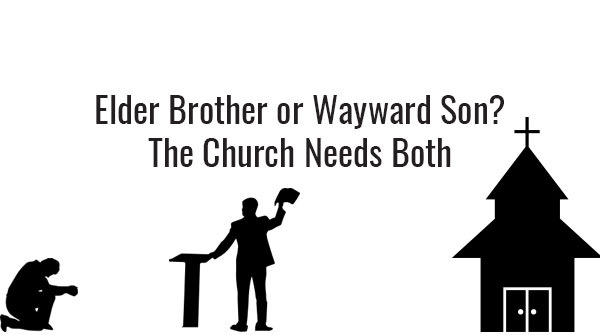I recently read Prodigal God by Tim Keller. The reconstruction of the Prodigal Son story has helped me visualize the reality of not the prodigal son, but the elder brother. The premise is that the story is ‘The Parable of Two Sons’ no just the ‘Prodigal Son’. It is that we mistrust God in one of two ways. Either we are younger brothers, free-spirits and focused on self-discovery, or we are elder brothers, self-righteous and moralistic. I wrote a song called “Not a Pharisee” as a teenager, so you should already know which one I am. I am an elder brother.
The Church Pharisee Problem
Based on experience, within Biblical church settings, we focus more on the prodigal son returning. We love the testimony of the lost and wayward sinner coming back to God in repentance and devoting themselves to a life committed to God. And yet, we often minimize the need for repentance in the elder son’s self-pride and moralism that is more prominently within the walls of the church. Our approach to knowing and loving God, our theology of God around repentance and the pursuit of comfort and security is often self-focused. We might say certain words but our heart is not aligned with a love for God.
The hope as a believer is that we seek the truth of who God is and learn practical wisdom to embrace adversity in a world that does not know Him. Getting this wrong keeps many in the church from knowing God and loving God in deeper and richer ways and growing in their relationship with Him. They lack greater intimacy and depth of relationship with the Father.
Repentance from Good Deeds
In repenting of only bad deeds, and not repenting of good deeds, pride comes in. This is the case of the Parable of Two Sons (act 2). In act 2, the elder brother stays silent when the Father asks the son to celebrate the return and salvation of his younger brother. Could his unwillingness to forgive and unrepentant heart steeped in pride keep the elder brother from his own salvation? In the Parable of Two Sons, this is the endcap of the story, believing that our good deeds are good enough.
Pharisaical Approach to Sanctification
I want to consider, not the need for the salvation of the Pharisee, but the tendency to return to a Pharisee’s approach to sanctification. The Pharisee is one who can not forgive the foolish acts of the younger brother. Secondly, they cannot trust God when He gives the return blessing to his foolish brother who has now returned again.
Repentance is not free. There is a cost. In this case, the cost was that the elder brother missed out on the full inheritance he deserved. The Father was willing to give His inheritance when the lost son left to squander it away, and then he gave all in abundance to Him when he returned. And the elder son could not forgive or celebrate with the younger brother.
Our Salvation
Tim Keller puts it profoundly in his book Prodigal God, “What must we do then to be saved? To find God we must repent of the things we have done wrong, but if that is all you do, you may remain just an elder brother. To truly become Christians we must also repent of the reasons we did anything right. Pharisees only repent of their sins, but Christians repent for the very roots of their righteousness, too. We must learn how to repent of the sin under all of our other sins and under all of our righteousness – the sin of seeking to be our own Savior and Lord. We must admit that we’ve put our ultimate hope and trust in things other than God, and that in both our wrongdoings and right doing we have been seeking to get around God or get control of God in order to get hold of those things.”
As a kid, I avoided the idea of Pharisees rather than realizing I am one and learning humility and submission with that acknowledgment that I indeed was and am a Pharisee. We all are. Admitting that and the awareness of that is what changes us and further conforms us to Christ.Prodigal God by Tim Keller helped me to see the elder brother in the Prodigal Son story. I see that I am a Pharisee. It changes me.

